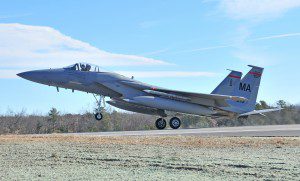WESTFIELD – Joe Mitchell, economic development director for the City of Westfield, travelled to Washington D.C. Thursday morning to speak in support of the Barnes Air National Guard Base.
Travelling in place of Westfield Mayor Daniel M. Knapik, Mitchell made the trip with Chicopee Mayor Richard Kos to discuss with members of the Commonwealth of Massachusetts’ congressional delegation the importance of avoiding funding cuts to the state’s six military installations.
When Knapik couldn’t make the trip due to prior commitments, he assigned Mitchell, who served in the Air Force and is former Chairman of the city’s Airport Commission, to sit in his place.
“I met with Congressman Richard Neal and the rest of the Massachusetts delegation with the exception of Congressman (Stephen) Lynch and Senator (Elizabeth) Warren, who had prior commitments,” Mitchell said. “It was just a general discussion about all of Massachusetts and the partnership between the state, the various military branches, and the local communities.”

Capt. Osme Benedict of the 104th Fighter Wing at Barnes Regional Airport gives a thumbs up signal from the cockpit of an F-15 fighter jet as he lands on the newly reconstructed 9,000-foot runway. (Photo by Frederick Gore)
Mitchell, Kos, and the Bay State’s representatives met with Air Force Secretary Deborah Lee James about the benefits of maintaining the bases in Massachusetts.
“It is economically advantageous to keep the bases the way they are, if not even expand on the bases,” said Mitchell. “It’s a force multiplier for the dollars spent there.”
He cited the state’s recent $177 million military bond bill, signed into law by Governor Deval L. Patrick, as evidence of the state’s approach to upgrades.
“I described the runway rehabilitation we had done in Westfield, and how there was a partnership between the Department of Defense, the City of Westfield, the Federal Aviation Administration, the state’s Department of Transportation, and the bond bill and how we got that job done,” Mitchell said. “How it started as a $20.77 million project, and we got it done for $16.7 million. Using some other synergies, using local contractors who won the bid to bring that in under budget.”
Mitchell said that James communicated her budget constraints and the challenges she faces, and that the meeting was important in starting a dialogue on the future regarding the Bay State’s bases.
“This is just the first of several future meetings to help communicate our piece across and to help her with her decision making,” said Mitchell.
“Some were more broad speaking statewide, others were speaking to the base in their district, whether it be the Cape, Hanscom Air Force Base, etc,” he said. “They were very enthusiatic, which is a good thing – some communities don’t want the bases. They spoke of how the base that is in their district is interactive with their community. Westfield is a perfect example of that.”
“It’s private and public investment. The airport is owned by the city, but we have private investment in companies like Rectrix and GulfStream and others, and with the military aspect,” he said. “Other bases communicated that to the Secretary, as well, that, compared to traditional Air Force or National Guard bases that are owned by the Department of Defense, with these partnerships, it’s economical to keep these bases open and provide economic engines with the communities.”
Mitchell said that Neal, the longtime Congressman for western Massachusetts, really sought to emphasize the collaborative nature of the bases and the Commonwealth through the recent bond bill.
“He wanted to make sure that she (Sec. James) understood about the bond bill, and how the state is a partner, and that we want to keep these bases open and viable as a partnership between private, state and Department of Defense investment,” said Mitchell.


